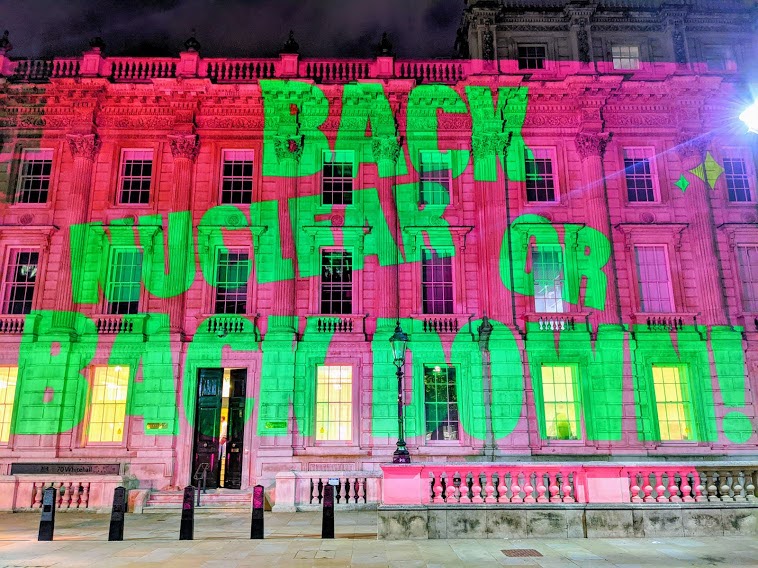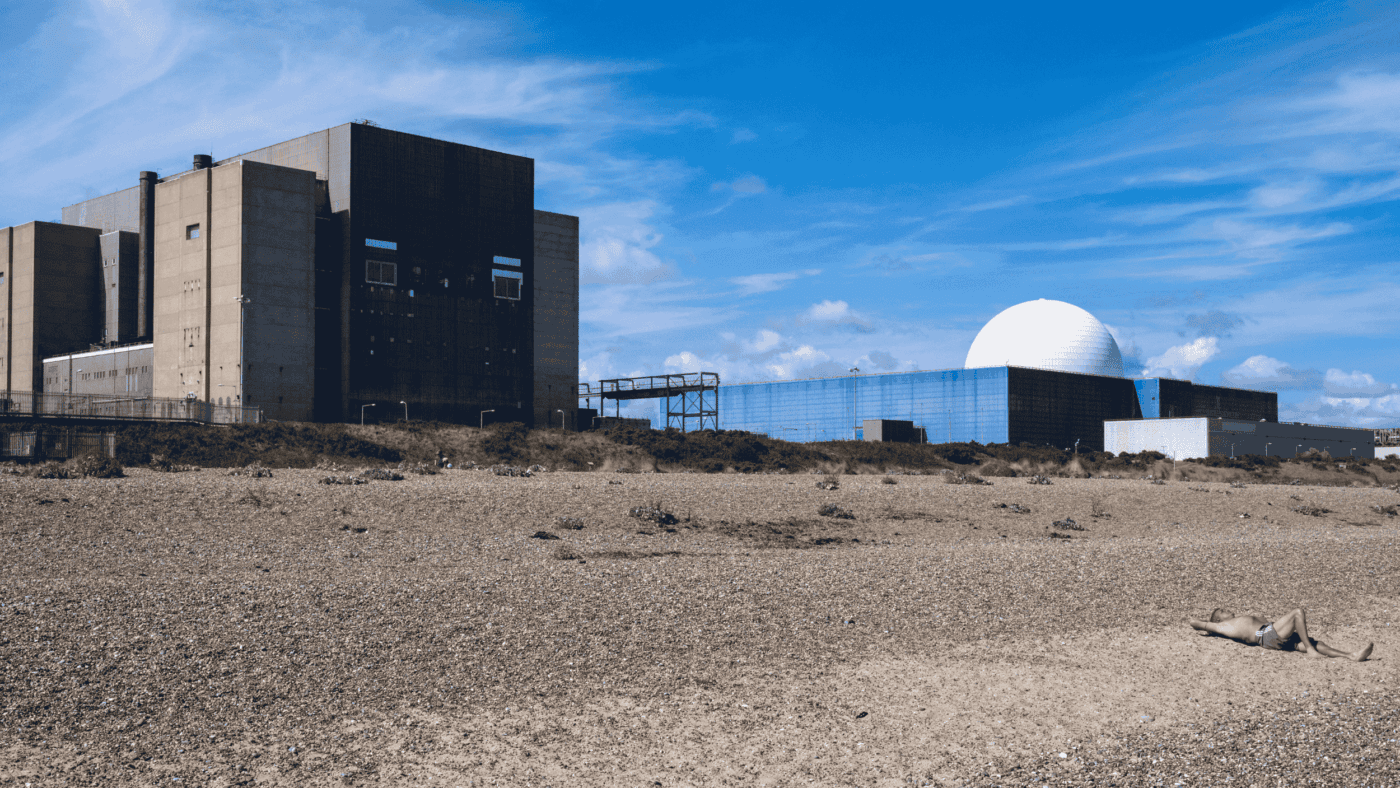This is an open letter to Ed Miliband, the Secretary of State for Energy Security and Net Zero, organised by Emergency Reactor.
Dear Ed,
For three days in a row last week, your morning cuppa was brewed with the sponsorship of the shale industry, as gas and firewood accounted for around 80% of electricity generation.
For the second time in a month, last week, Germany’s electric grid was hit by a wind drought, known in Germany as a Dunkelflaute. This not only put our energy security at risk, but the lack of wind sent Europe’s electricity prices soaring. In response, Norway announced that it wants to dismantle the undersea cables that connect its grid to mainland Europe to protect Norwegians from Europe’s volatile electricity market, and Sweden’s Deputy PM and Energy Minister has said that she is ‘furious with Germany’ for dismantling its nuclear power plants, causing a spike in energy prices in Sweden.
We are a diverse group of volunteers who care for the environment and are concerned about air pollution and climate change. We understand that nuclear energy is a core part of the solution to these problems, therefore we welcome the news that the operating licenses for four generating Advanced Gas Cooled Reactor stations have been extended so that Heysham 2 and Torness will keep producing power until March 2030 and Heysham 1 and Hartlepool until March 2027. We also celebrate the arrival of the unit 1 reactor at Hinkley Point C. But what comes next?
At present the UK’s clean energy policy relies heavily on wind and solar power. Hinkley Point C will play a small role in the future, but it will not replace the generation we will soon lose from old reactors being decommissioned due to their age – many of these will go offline before new nuclear power plants can replace them. In short, we are following in Germany’s footsteps.
On December 4, 2024 you tweeted ‘These sites power 1.8m homes and support 3,000 jobs in Lancashire, Teeside and East Lothian. Nuclear is at the heart of our mission for clean power.’
Nuclear is not the heart at the moment. That’s because ‘Net Zero’ has somehow come to mean ‘mostly wind and solar power’, but no large industrialised nation in the world has been able to decarbonise without a lot of baseload reliable clean energy, which is usually from nuclear energy, and also from hydropower in countries that benefit from sufficient geographically suitable plant sites. ‘Net zero’ should mean ‘fossil-free’ power, the way it does in other European countries.

.
Germany is a useful case study, as their energy policy, named Energiewende, was to phase out all baseload power, including nuclear and coal, to rely only on wind and solar power. Despite heavy investment, they were unable to achieve this. Germany is now suffering from energy scarcity, expensive electricity for its citizens, increased dependence on coal, increased dependence on high-risk international energy sources, and de-industrialisation as many of their large manufacturers cannot afford the country’s high energy costs and have moved abroad or shut down. Although nuclear is not being deliberately phased out in the UK, the failure to commit to fully replacing our fleet, let alone extending it to meet the demands of ‘electrifying everything’ to achieve net zero amounts to the same thing.
The dangers of gambling on a mostly wind and solar grid is continued fossil fuel reliance and worsening climate change and air pollution.
Critics will tell you that nuclear energy is too expensive, but according to a recent study Germany spent over €750 billion on Energiewende. Nuclear power plants are also undervalued by economic metrics which discount investment over periods of just a few decades, while it is increasingly recognised that mature technology Pressurised Water Reactors such as the EPR are likely to have lifespans approaching a century.
A recent report published by the Tony Blair Institute considers the reasons nuclear has stalled globally and suggests that the trend can be reversed if decisions are made to begin new nuclear programmes. The TBI report summaries that if we had continued to build nuclear,
‘last year, global energy-related emissions would have been 6% lower, saving 2.1 Gt of CO2. This would be the same as taking about 460 million cars from the road for a year or removing the combined total 2023 emissions of Canada, South Korea, Australia and Mexico.’
Most Britons support Net Zero ambitions and nuclear energy, and they would like to see their electricity costs come down.
Why do we support building more nuclear power plants?
- Nuclear power plants produce clean energy that does not contribute to greenhouse gas emissions or air pollution the way fossil fuels do (particularly coal)
- They are reliable, with the highest capacity factor of all energy sources, meaning they supply electricity 24/7 with the least interruptions
- They require less resources and mining than all other energy sources
- They have the smallest land footprint of all energy sources, which means they need less space (which means a higher biodiversity gain)
- Due to the energy density of the fuel they require less raw material than fossil fuel generation
- They have a longer in-service plant lifetime than wind or solar installations
- Due to their longevity they require less dependence on other countries’ resources once they have been built
- They use the existing grid; coal to nuclear capability has been well documented
- Existing infrastructure for mothballed nuclear and coal power plants can be used to site new reactors
- They provide well paid, highly skilled, unionised jobs often to the most deprived areas due to being situated in relatively isolated locations where there is rarely other industry present. This provides a local economic boost as well as strengthening the economy of the country they are in
- Due to their longevity and reliability they essentially pay for themselves over their lifetimes
- They provide cheap electricity for citizens and businesses – the regions in the world with the most nuclear power plants also have the lowest energy prices
Support for new nuclear reactors is high in many areas in the UK. They could be built at Wylfa, Moorside, Oldbury, Bradwell, Berkeley, Heysham and Hartlepool, providing jobs and opportunities for communities and strengthening their economies.
Like Sizewell C, these sites also benefit from existing power plant infrastructure and a willing and capable workforce who describe benefiting from the jobs and opportunities the nuclear sector has brought them.
We also urge you to consider reviewing and reforming the regulatory processes of nuclear power plants, so that they can be built in good time. The historic global average build time of nuclear reactors is 7 years, while South Korea and China are routinely building them in around 5 years. We can do this too. Nuclear science is part of Britain’s heritage: during the mid-twentieth century, the UK was a world leader in nuclear fission and in the development of nuclear technology, British scientists were preeminent in the development of nuclear energy through to the early 1940s, and the University of Manchester has a long history of nuclear physics research. Let’s reclaim what we know.
You were correct in calling nuclear the ‘heart’, because it is the organ that keeps pumping 24/7, reliable and essential. Wind and solar power cannot do it alone.
The significance of the role nuclear energy will play environmentally and socially has been proved by countless studies, which calculate the lives saved by nuclear energy through displacing coal, and the lives lost to air pollution through shutting down nuclear power plants. We urge you to ensure that nuclear energy is represented as the heart of UK energy policy, as the main source of homegrown energy generation, rather than an afterthought, to keep society ticking without costing the Earth.
All we want for Christmas is clean and affordable electricity.
Signed,
Members of Emergency Reactor
Zion Lights, Science Communicator & former Labour City Councillor
Mark Dawes, Senior Systems Developer
Arun Khuttan, Chartered Engineer
Louis Jacques, Rail Business Development
Adam Brush, firefighter
Rob Loveday, MSc Paleontology
Owen Thomas, Recruitment Manager
Alex Clements, Analytics Director, London Stock Exchange Group
Alasdair Lumsden, BEng, Director, Carbon Neutral Fuels
Andrew Kay, Toolmaker
Geoff Campion, retired Management Accountant
John Stumbles, Engineer
.
Other signatories
Yvonne Atkinson, Labour County Councillor
Trudy Harrison, former Conservative MP
Professor Wade Allison, Emeritus professor of Physics, Oxford University
Dino Rosati, Electrical Engineer, Cofounder of Fortress Technology Inc.
Karen Whitfield, Clinical Scientist
James O’Malley, journalist and writer
Steve Wood, CEO, Fylde Coast Energy
Jonathan Fletcher, Site Supervisor
Jon Treadway, Consultant and researcher
Dr Thomas Athorne, Software Engineer
Phil Clarke, Head of Health and Safety
Miguel Trenkel-lopez, Mechanical Engineer and Founder of CurieUs Games
Darren Thurston, HR
Peter Hughes, BSc, CTO Energy and Finance
Neville Chamberlain, Chairman, Supporters of Nuclear Energy
Peter Havercan, member, Supporters of Nuclear Energy
John Assheton, member, Supporters of Nuclear Energy
.
Click here to subscribe to our daily briefing – the best pieces from CapX and across the web.
CapX depends on the generosity of its readers. If you value what we do, please consider making a donation.


